#real dialogue and gay turtle moments.
Explore tagged Tumblr posts
Text
Kay so if anyone wants the low down on power ring lady ep. Main villains and divorced married couple shredder and krang are doing their whole bitchy whose evil plan do we do today thing when krangs ex shows up. Her name is shreeka btw. And she wants her ring back from him and is keeping the henchmen (slash children of divorce) hostage. And krang takes the ring out his chest compartment (hes brain in a robot body, but not how u think) and its in a little blue box and everything. and gives it to shredder. who loves the new power ring. but psych theyre gonna give the ring to their enemies to get shreeka to go after then and also hopefully lose there henchmen/children. (broken family 😔)
anyway the rest of the plot happens with shreeka's day out hanging out with. the henchmen. they go shopping (rob a jewelry store). find the heros. grab the ring. and fight until leo (leader turtle), spears a hot coal on his katana like its a marshmallow, and flings that at shreeka. who catches it. in her hand. but its okay her hands are impervious to fire. but the ring isnt. points out the mutant rhino one second before that clip happens. and one second after it raph (funny turtle) say thats why they call her that [shreeka] (for shrieking...)
#some shit#turbles...#we were. already delighted by the episode BEFORE we realised. what it fuckingwas.#the evil plans in contention were like. steal a. lazer. or smth like that. and literally actual do a killdozer. 'i dont understand ur#armoured bulldozer plan' is the line or smth.#anyway great ep all time ep its going on the list of good eps and if we ever tier list them im voting for s tier#the family dynamics on the villains is not a reading its just. the show. other running jokes include#'how come their MY mutants when they do smth wrong' and such.#ohhhh wait and donnie says shreekas is imfamous for commiting 'crimes too unspeakable to even speak of. and being a snazzy dresser'#real dialogue and gay turtle moments.
18 notes
·
View notes
Text
now newt you may be thinking you’ve decided to double major and have a minor in your greatest act of nomative determinism yet how could you POSSIBLY have time to keep your mind sharp and sexy with real books and still read fanfic? well i’m going to college in a pandemic, that’s why. hardest battles sexiest soldiers and all that. here’s some white boy tuesday.
Overworked by Ferrety
WHAT a good good depiction of a meltdown and an even better autistic hermann. great fresh voice that feels true to character, the buildup is well paced so that when the h/c does hit it’s well-earned and cathartic, and all in all some really good classic lab era whump
double back by @ghostpressure
ghost drift translated to prose is really hard to pull off, so big kudos for keeping things poetic and mind-fucky, but still coherent and easy to understand. i love the little crystalized moments we get that tell us how clearly hermann is cataloguing them, which is a great detail to show inner thoughts rather than telling. i love love love the dialogue; it bounces the line between proper banter and the more serious, introspective tone the fic takes very well
All Clear by @trifoliate-undergrowth (NSFW)
this bitch has the TROPES. hate makeouts? arguments turn to more? trapped somewhere together and tension rises as they’re forced to wait it out? WALL SLAM HELLO. never before have i actually seen so many classic newmann faves for nsfw in one place and it’s like the scholastic book fair for adults. very cute voice for hermann as well, because oh yeah, he really is a dude in his late 20s and not actually an 80 year old turtle in a sweater
heat of the moment by @kingeiszler (NSFW)
if any of you so much as LOOK at me i will stomp you to death with my hooves. trans horny newt rights also i was NOT expecting that angst with a happy ending moment at the end but like fuck. this fic is packing about as much good stuff as the front of newt’s hot topic jeans. hermann gottlieb god of WAP
Dress Code by @arcanemoody
there are not enough fics centered around newt and his self-image post-pru and ESPECIALLY not enough dealing with him finding his style again. i think this concept is such a good one to explore nonbinary newt through (if i get a single “kinnie” in my askbox i’m writing a fic where stan twitter outs the precursors as possessing newt because they made an account and popped off. do not test me you all know i’m fucking crazy but i’m free) since so much of gender presentation is in clothes, along with the other stuff the precursors clearly took over in uprising. and then i know we all love to interpret the “whoever will take him” as newt being bi but i’m always glad when it’s noted in fic, and the way it’s used to develop his character works very well
The Geiszler-Gottlieb Wedding by Goldmoth
if for nothing else please go to the second chapter of this fic and read the playlist because i literally fell out of my bed laughing and had a bump on the back of my head the size of a cherry. worth it.
Baby, I’m a fool for you by @that-one-fandom-chick
wingman vanessa supremacy. twilight soundtrack supremacy. hermann meeting newt while he’s in a band SUPREMACY also with a lot of these fics combining it with “first meeting” everything usually goes wrong, but it was so refreshing to have that extremely cute diner scene at the end.... the old friend mitski vibes of it all........ gay hands hermann rights
Now We Have the Salad by MnemonicMadness
i wanna say right off the bat this concept tickles me so deeply because if a non diabetic person switched bodies with a t1d (moi) i would have to helicopter parent 90% of everything they did if i didn’t want to, like. die. or at least have a fucked a1c. anyway this is a really great twist on the body swap trope that takes full advantage of hermann’s disability as a plot point, and with the added variety of being post-uprising. that last bit is what makes the story work, actually, because if it were simply pr1 era, you wouldn’t really have an excuse for newt so desperately wanting to give hermann time in a pain-free body without it coming off as pitying and insensitive. but tack on the guilt of the precursors, and what they did to hermann, and you have the perfect justification for newt’s actions. smart writing! and some good old mortifying ordeal of being known that stays tasteful in context
i’m drawn to you, honey, like the sea to the fisherman’s daughter by @campgender
i love a good post pr1 beach house fic i cannot lie! “newt and hermann don’t have ppdc jobs anymore but they sure do have trauma!” fics have sort have gone out of fashion post-events that occurred in 2018, but this one is a very good blast from the past. i love the beginning, which is such a fucking accurate depiction of how people used to having to be hyper competent in traumatic situations react to it being all over abruptly. i LOVE LOVE the ending, it’s so true to character and what i hope a good pr2 would have done for newt. this thing is chock-full of so many good lines, like “Maybe I don’t know how to live with nice things.” fucking MOOD and “’If you’re good enough at what you do,’ Hermann says firmly, ‘which you are, people tend to pretend as if the rest of it doesn’t exist.’” is so so accurate to the academia climb when you’re disabled, let me fucking tell you. great moment after great moment.
I’ve Got Your Letter by @coloredpencilroses
A if i rec this then ten things i hate about you au in my mouth please. please. please. anyway this fic is SO fun and good i love the writing style and how the humor is fun and consistent throughout both povs, the slowburn keeps things agonizing but has enough fun characters and plot to keep you invested and not just begging for an end so you can skip to it, TENDO KING OF BRAIN CELLS, and i haven’t seen you’ve got mail so i’m literally saving it until this thing finishes to keep the suspense. excellent fic for autumn
now usually this is where i plug my most recent work but since #theprecursorsareoverparty has spawned a more vitriol and hateful reaction than i ever could have dreamed, read i never liked that ending either and get yourself some culture. and stan tom stoppard
45 notes
·
View notes
Text
Mirror, Mirror: When Movie Characters Look Back at Themselves by Sheila O’Malley
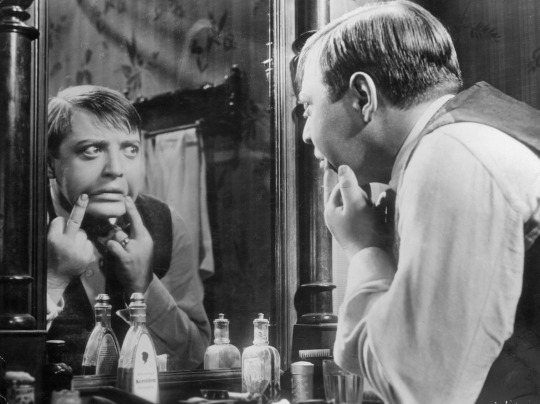
“I always feel it behind me. It’s myself. And I follow me. In silence. But I can hear it. Yes, sometimes it’s like I’m chasing myself. I want to escape from myself. But I can’t!” —Peter Lorre as child-murderer, M (1931)
There was a period in the ‘60s and ‘70s when you could barely call yourself a male movie star if you didn’t do a scene where you stared at yourself in the mirror, doing various “private” things. The device shows up before then, too, but the floodgates opened in the ‘60s and ‘70s. Meryl Streep has observed, “Often the scenes that are the most exciting, and most illuminating in film, are the ones with no dialogue…where a character is doing something alone, where the deepest most private self is revealed or explored. Exposed.”
Mirrors have multiple thematic uses (as well as the obvious directorial choice to add visual interest to the frame). But if a character is inarticulate, then seeing him “deal with” his reflection can fill in some gaps. It’s a great storytelling shortcut. If the character has a firm public “mask,” a “mirror scene” can let us see who he is when no one is watching. We all lie, to some degree, out there in the world (or on social media). We construct a “self” and a mirror scene allows the character to strip that away.
Speaking stereotypically (or, in archetypes), what is expected of male characters in terms of public persona is different from the pressures on female characters. Not better or worse, just different. Crying, showing uncertainty, weakness, vulnerability … can be a minefield. This is why the glut of male mirror scenes in the 70s makes a kind of sense: as the women’s movement rose, men began to wonder about their place, as well as buck against some of the gender norms imposed on them (or, in some cases, re-entrench said gender norms, Travis Bickle’s “You talkin’ to me” the most classic example).
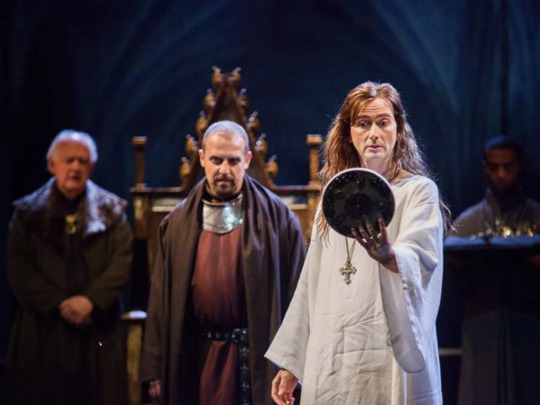
Shakespeare’s use of the soliloquy—in particular for Kings and prospective Kings—could be seen as mirror scenes, with the audience as the mirror. A man goes into a private space, showing the audience things he cannot show on the battlefield or in the court. Hamlet, one of the most introverted of Shakespeare’s characters, showing non-gender-norm qualities of uncertainty and sensitivity, has a massive six soliloquies. (“O that this too too solid flesh would melt”, “O what a rogue and peasant slave am I”, “To be or not to be”, “Tis now the very witching time of night”, “Now might I do it pat” and “How all occasions do inform against me.”) It is impossible to imagine the play—or Hamlet—without them. In Richard II, after Richard is forced to surrender his crown, what is the first thing he does? Like a true narcissist, he calls for a mirror. As he stares at himself, he wonders,
“Was this face the face That every day under his household roof Did keep ten thousand men?”
and throws the mirror on the ground.
Mirrors are powerful and mysterious symbols. The doubling-up can mean all kinds of things. Alice steps through the looking glass into another world. Goethe’s Faust looks into the witch’s mirror and sees a beautiful woman staring back. Dorian Gray takes a mirror to compare his face with the one in the attic portrait. (Like Richard III, Dorian smashes the mirror.) A mirror is crucial in Tennyson’s “The Lady of Shalott,” where “The Lady” is cursed to view the world only through a mirror. But then Lancelot rides by and she can’t help it, she has to sneak a peek. Maybe the most famous fictional mirror is the Evil Queen’s in “Snow White,” the one she asks every day, “Mirror, mirror, on the wall, who’s the fairest of them all?” Richard III doesn’t look for a reflection of his beauty. He wonders where his “self” even is, without the crown.
An early male mirror scene—and one of the best—is Peter Lorre’s in Fritz Lang’s M (1931). Our first glimpse of Lorre’s face comes without warning. As a handwriting-analyst theorizes in voiceover about the child-killer’s psychology, we see him, staring at himself in the mirror. He pulls at his face, slowly, manipulating his mouth into a smile, trying it on for size, maybe seeing what it looks like to the children he seduces. He bugs his eyes out, turning this way, that, a maniacal presence, almost like a shark rolling its eyes backwards as it attacks. He has no sense of what human beings feel like, of what he looks like, of how to even make a facial expression. It’s one of the most chilling private moments in cinema.
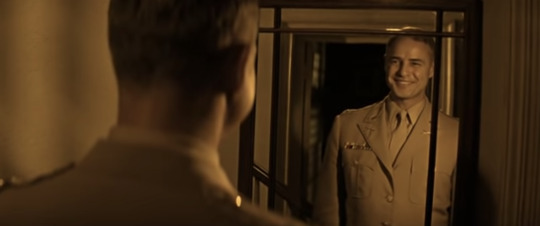
Speaking of “private moments”: Constantin Stanislavski wrote a lot about how actors needed to feel “solitude in public.” He wrote: ”During a performance, before an audience of thousands, you can always enclose yourself in this circle…You can carry it with you wherever you go.” Lee Strasberg developed his “private moment exercise” to help actors achieve “solitude in public.” There are things you do when you are alone which you would stop doing if someone walked in. Maybe you sing along to the radio. Maybe you talk to yourself. Maybe you pick your nose. Maybe you do all of these things simultaneously. Our “public” selves are drilled into us from a very young age. There are “good manners,” there are “contexts” to be memorized—what flies at home will not fly outside the home. Breaking down the public face, letting an audience see who you are when you are by yourself, is part of the actor’s job. (It’s not a surprise that the '70s came to be dominated by private-moment mirror scenes, considering the influence of the Strasberg method on acting styles.)
One of the most important mirror scenes, and a huge influence on Martin Scorsese, is Marlon Brando’s in Reflections in a Golden Eye, directed by John Huston. Brando plays Major Weldon Penderton, a closeted gay man married to a frustrated, luscious Elizabeth Taylor. Late at night, Penderton sits alone, staring at pictures of naked male statues from Greek antiquity. The character lives in an almost totally male world (the military), turned on by young soldiers, and terrified of revealing himself. In one scene, alone downstairs in the house, he walks into the hall and stares at himself in the mirror. After a moment of vacuity, he begins to talk to himself, or, more vulnerably, to an imaginary other person. He pretends to respond to what the other person says, he practices laughing, and he smiles, but the smile is superimposed. He can’t get it to look real. What he says is a kind of murmur, a “pretense” of conversation. This is the kind of vulnerability Brando could achieve like no other. Without this scene, the Major could have been a caricature. All we see is his fuddy-duddy sexless stiff public mask. The mirror scene shows his confusion at how to be a man, how to navigate even a casual conversation.
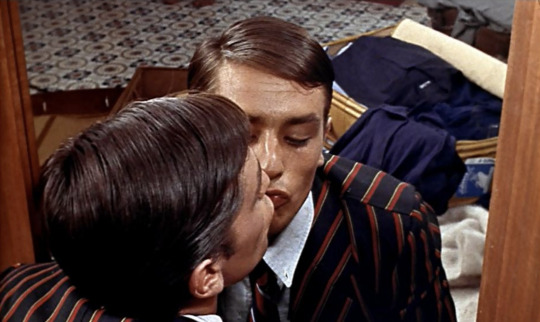
Alain Delon has a stunning mirror moment in Purple Noon (1960), Rene Clement’s adaptation of Patricia Highsmith’s The Talented Mr. Ripley. Delon plays the sociopath Tom Ripley, in thrall to his casually masculine friend Philippe Greenleaf (Maurice Ronet). Delon’s chilly presence onscreen works to beautiful effect: He doesn’t show us much. But then, he tries on Philippe’s clothes, a sleek pinstripe jacket, fancy shoes. He checks himself out in the mirror. Most actors would leave it at that. But Delon understood the homoerotic implications of the script, not to mention the character’s dangerous narcissism. Delon leans into the mirror and gives himself a rapturous long kiss, slitting his eyes open at one point, to check out what he looks like.
It’s interesting to contrast this with the same scene in the 1999 adaptation, The Talented Mr. Ripley, starring Matt Damon. Director Anthony Minghella makes the subtext practically text, by placing mirrors in almost every scene (the final shot of Ripley is through a mirror). When Ripley tries on his friend’s clothes, he dances around to Bing Crosby’s “May I,” doing a vaudeville burlesque. It’s a different kind of rapture than Delon’s swooning kiss. Damon’s drag-style dance is more for the audience, an explicit display of inner gay-ness, what Ripley is hiding beneath his good-natured submissive public persona. It’s a good scene, although I prefer Delon’s. Delon’s kiss is Stanislavsky’s “public solitude”—and it shows the terrifying void within the character. There is no self. The entire world is a mirror.
In Karel Reisz’s gritty Saturday Night and Sunday Morning, Albert Finney’s Arthur, in a whirl of work, sex, and alcohol, is suddenly caught by his reflection one hungover morning. He was beat up the night before. He plays at being a sniper through his window, targeting local women with pellets. It’s a thin line between playfulness and murderous acting-out. Finney digs into this aspect of the character when he suddenly speaks to his reflection. It is a statement of bravado before descending into confusion: ”I’m me and nobody else. Whatever people say I am that’s what I am not, because they don’t know a bloody thing about me. God knows what I am.”
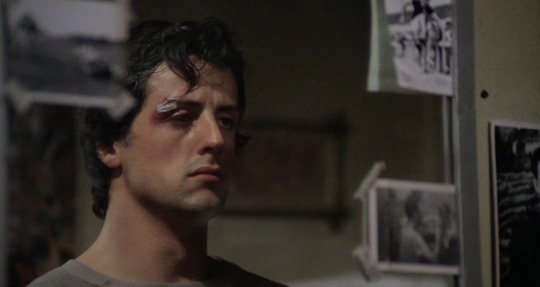
For the opening sequences of Rocky, we see Rocky Balboa’s normal “day in the life.” We are introduced to him through various public selves. But when he goes home to his dank apartment, feeding his turtles, gentle and quiet, his loneliness is so acute it reverbs off the screen. Childhood photographs of him line the mirror frame, and Rocky stares at them, his big-lug face almost crushed in disappointment. Holding a container of turtle food, he starts to talk to himself. What he’s saying doesn’t sound like anything, just private-moment murmurings, but in the next scene, when he goes to visit the girl in the pet store, it becomes clear. He was practicing a joke to tell her, a joke designed to make her laugh, show her he’s a safe person, he’s nice. Rocky practicing a joke in the mirror is one of Stallone’s most vulnerable moments as an actor (and evidence of his gift as a screenwriter).
John Travolta’s mirror moment in 1977’s Saturday Night Fever is star-making, not just because of Travolta’s almost otherworldly gorgeousness (as well as how he revels in said gorgeousness, behavior considered coded-female). Surrounded by 1970s icons—posters of Rocky, Serpico, and Farrah Fawcett—he blow-dries his hair, places gold chains around his neck, and stands like a superhero in his black speedo briefs, shot from below. Perhaps the most revealing thing about the scene is that when his father barges into the room, Travolta’s Tony Manero does not stop what he is doing. His lack of embarrassment tells us everything we need to know about the character.
Francis Ford Coppola’s epic, Apocalypse Now begins with a hallucinatory sequence showing a PTSD-rattled Martin Sheen, holed up in a hotel room in Saigon, tormented by memories. In one shocking moment, Sheen stands unsteadily, and lurches around in front of the mirror, flailing his arms out in imitation martial-arts moves, an attempt to combat his helplessness and anguish, his impotence. But the gap between reality and fantasy is too great, and he, like Richard III, smashes the mirror.
Richard Gere’s mirror moment in American Gigolo is a distant cousin of John Travolta’s. His Julian has carefully crafted an immaculate persona for his female clients, and part of the movie’s pull is watching it get stripped away. At home, Julian wanders around, practicing Swedish, working out, picking out clothes for his next appointment. He’s vain, but vanity is part of his job. Smokey Robinson’s “The Love I Saw In You Was Just a Mirage,” and it’s perfect because Julian literally is a mirage. To his clients, to himself, even. When he stands in front of the mirror, flexing his muscles, he is more Evil Queen than Richard III, a destabilizing of gender norms around male sexuality (and self-presentation) which is so much a part of the film. (When Julian meets a private detective, it’s at a joint called the Me & Me Coffee Shop. Julian’s hall of mirrors shatters by the end of American Gigolo: in the final scene, he talks to Lauren Hutton through a glass partition in prison. The mirror is no more. He can see through it now to the other person, and, crucially, he can be seen, too, as he really is.)
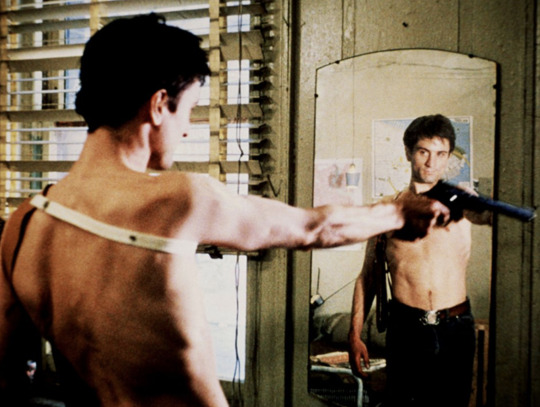
The most famous mirror moment is, of course, Robert De Niro’s in Taxi Driver. In the insomniac voiceover, his Travis Bickle says, “I think that someone should become a person like other people,” showing the character’s alienation from other humans. You aren’t already a person, to Travis: you have to become one. As Travis descends into psychosis, dreaming of 1. impressing the cool blonde (Cybill Shepherd) who rejected him after he took her to a porn movie on their first date and 2. rescuing the child prostitute Iris (Jodie Foster), he begins to amass a small arsenal, putting together boot holsters and straps to go around his wiry body. In the unforgettable moment when he checks himself out in the mirror, he goes into a zone of macho fantasy. (Schrader’s script said only “Travis speaks to himself in the mirror.” De Niro’s “You talkin’ to me” was his improvisation.) De Niro goes so far into his sense of privacy, it’s almost embarrassing to watch. And yet it’s so human, too. (If you say you’ve never talked to yourself in the mirror, or sung in the shower, you’re lying.)
De Niro’s second mirror moment is Raging Bull’s final scene, when the bloated Jake La Motta recites Marlon Brando’s “I coulda been a contender” monologue from On the Waterfront, before standing up and doing a series of “pumping up” exercises, to get ready to go onstage. (Side note: Mary Elizabeth Winstead closes out Eva Vives’ wonderful 2018 film All About Nina, about a troubled stand-up comic, with a re-creation of the scene from Raging Bull.) What’s fascinating about the Raging Bull scene is that Jake La Motta has no “self” to reveal. It’s almost like there’s no inner life at all. He doesn’t “get it.” He never did, he never will. De Niro blanks himself out in a very unnerving way, opposite to the dangerous vengeful-spirit fantasy he inhabits in Taxi Driver.
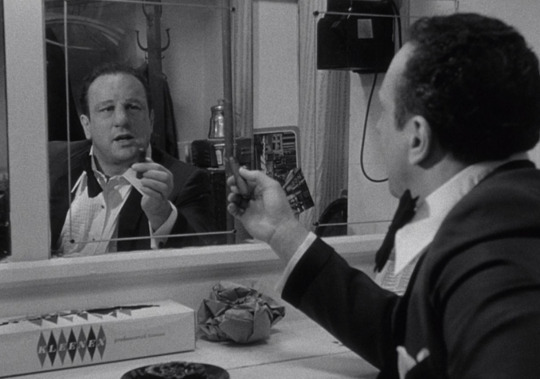
Although Walter Hill’s Johnny Handsome descends into a cliched crime movie with paper-thin characters, the opening sequences are dark, cynical, and atmospheric. Mickey Rourke plays Johnny, a man with a deformed head, an “ugly” appearance which has separated him from other humans. Reminiscent of the Joan Crawford film A Woman’s Face, a caring plastic surgeon (Forest Whittaker) offers to operate on Johnny, to give him a chance at a new life. When Rourke unwraps the bandages and sees his new face (i.e. Rourke’s real face), Rourke has a mirror moment like almost no other, a moment worthy to be placed alongside Brando’s and De Niro’s. He touches his face with wonder, bursting into tears. That’s touching enough, but then, as he glances back at Whitaker, Rourke goes deeper. A look of fear, and lifelong anguish floods his eyes, as he says, “I feel like I still have a mask on” and then, after that, Rourke goes even deeper into a maelstrom of emotion: gratitude, bafflement, awe, despair. The scene is Rourke’s finest hour.
Up until recently (with a couple of exceptions), when women stared at themselves in the mirror in the movies, it was obvious what they are doing: touching up their makeup, checking out their mask. Once again, in the 1960s and 70s, women started doing “mirror scenes” equivalent to men’s mirror scenes, where the purpose was not perfecting the public mask, but to - as Sylvia Plath wrote in her poem “Mirror” - search “my reaches for what she really is.” Faye Dunaway has a great one in Jerry Schatzberg’s Puzzle of a Downfall Child. Gena Rowlands has quite a few “mirror scenes” in the movies she did with Cassavetes (there’s a couple of stunners in Opening Night). In my favorite moment in Sofia Coppola’s The Bling Ring, after breaking into Paris Hilton’s house, Katie Chang goes into a daze of mad-woman fantasy, staring at herself in Paris’ mirror. It’s not hard to imagine the character slipping into the Manson family, if a Manson came along. She’s as blank as Jake La Motta. In La Verite’s opening scene, Brigitte Bardot stares at her face in a broken shard of a mirror, right before marching off for her court date. Her “self” is fragmented, broken. Jennifer Jason Leigh has an extraordinary extended “mirror scene” in Georgia. The moment is everything: self-hatred, rage, searching and longing, and bone-deep narcissism.

Men staring at themselves in the mirror let us into their secret worlds, their fantasies and anxieties, uncertainties and vulnerabilities. It’s not about being self-obsessed. It’s trying to find the self, the self that is not allowed free rein, be it a benign self or a malevolent one.
In Caravaggio’s “Narcissus,” Narcissus leans towards his reflection in the water, his posture pulled downwards with a seductive tug. He braces himself by his hands on the ground, and his knee, bulging out beneath his torso, is the only barrier between Narcissus and his reflection (and, perhaps, drowning). In the painting the reflection below is cut off; all we see are the forearms and that gleaming sturdy knee. Even though Narcissus’ body is barely visible, even though he’s hunched over himself, his energy is childlike, soft and open. He gives his reflection a caressing stare, a swooning look. He yields. This is not just vanity. This is something else.

#musings#film writing#film essay#oscilloscope laboratories#beastie boys#adam yauch#independent film#mirror#taxi driver#robert de niro#Martin Scorsese#american gigolo#fritz lang m#peter lorre#the bling ring#sofia coppola#shakespeare#richard ii#saturday night fever#john travolta#rocky#sylvester stallone#gena rowlands#faye dunaway#marlon brando#reflections in a golden eye#raging bull#jake lamotta#johnny handsome#mickey rourke
43 notes
·
View notes
Text
Oscar Predictions
Chris' Movie Review 2017 Oscar Predictions It's that time of year again. This Sunday, we'll find out who will win the most prestigious award in the film industry. Unless you think the Oscars are just movies that are literally made to be nominated, then yeah, I can see your point in why you wouldn't watch. I will list the nominees in order of who I think will win to the least possible winner. That way you can see my thoughts on each nominee. Any questions? You can ask below in the comments. Otherwise, here we go. Best Picture Nominees 1. La La Land (My Prediction) The movie is just fantastic. I love watching this film so much, that I want to watch it again. Even though it caters to the Hollywood stereotype, it's still a gorgeous and well acted film. 2. Moonlight This film touches on a subject that we don't get to see very often, a gay black man growing up in the hood. The struggles of this child learning to accept himself and grow up with a distant mom is challenging. The movie can feel slow at times but there are some powerful moments throughout. 3. Manchester By The Sea The movie takes awhile to really pick up but this is one of the more realistic scripts this year. The film takes an unique approach to depression by adding comedy into the mix. The movie is very dramatic at times but again, the first hour is very sluggish. 4. Hell Or High Water A well acted movie that has a great cat vs. mouse type story. Issue is, it's sort of forgettable. While there are some great scenes and good dialogue, the film just feels empty at times. 5. Lion Based on a true story, the first hour of this film really hits home with the struggles of a child who gets lost in India. As the movie progresses, he begins to feel extremely guilty that he left his brother, sister, and mom behind. The second act of this film doesn't do itself justice by cutting too much of the child's experiences when he moves to Australia to live with his adopted parents but the ending gives you a lot of hope. 6. Arrival Learning to communicate is key. And then there's a scene that just doesn't make any sense but it's okay, the rest of the movie is still good. While slow in pace, the film has a great atmosphere and brings about a lot questions that strike curiosity amongst yourself and others. 7. Fences The movie takes place in a house and it's basically just an actor's film. Denzel Washington and Viola Davis are really good in the movie but the one stop setting can get a little boring and the movie takes about an hour before it really gets interesting. 8. Hacksaw Ridge While the war scenes are gory and well detailed, the first act is messy and not well paced. If the first act could follow the footsteps of the war scenes, then the movie would be way higher on the list. 9. Hidden Figures A must needed film to exploit the real truth behind NASA's hidden heroes. While the movie does a great job telling the story of these black ladies that worked for NASA, it doesn't give itself time to let each character develop equally. It's still a solid watch and it's inspirational, but it's not as impactful as some of the other films on this list. Best Actor 1. Denzel Washington (Fences) (My Prediction) It's an actor's movie and Denzel kills it. Even if you think he's over the top at times, he's able to harness a full range of emotions for this character. 2. Casey Affleck (Manchester By The Sea) While it's basically one emotion throughout, you can see that Casey feels dead on the inside. He just keeps going because he's not sure what else to do. And maybe he'll find happiness one day soon...if he allows it that is. 3. Andrew Garfield (Hacksaw Ridge) Andrew is great in the war scenes. You see the pain and passion in his eyes but the first act slows him down in this film. 4. Ryan Gosling (La La Land) We've seen this role from Ryan before and, while he plays it well, it's just not something that's beyond his range. 5. Viggo Mortensen (Captain Fantastic) I didn't see this movie. Heck, did it even play in America? If it did, I never heard of it. Best Actress 1. Emma Stone (La La Land) (My Prediction) So this is kind of embarrassing, Emma Stone is the only actress I saw in this category. I never heard of Elle or Loving. And I honestly didn't see Florence Foster Jenkins because I thought Meryl Streep wasn't going to be in contention. And Jackie was something I was going to get around to but it was Oscar month. They dump all of the movies on you at one time. So if you want to disqualify my pick, you're more than welcome. But I know Emma has to be the lead candidate. Plus, they left off Amy Adams, the academy can go fuck themselves. 2. Natalie Portman (Jackie) 3. Meryl Streep (Florence Foster Jenkins) 4. Isabelle Huppert (Elle) 5. Ruth Negga (Loving) Best Supporting Actor 1. Lucas Hedges (Manchester By The Sea) (My Prediction) Lucas really brings the movie to light once he gets on screen. Casey brings it down, Lucas brings it up. It's a good balance between the two and I could even contend that Lucas was better than Casey. 2. Micheal Shannon (Nocturnal Animals) Honestly, if Jake Gyllenhaal is considered a supporting role, then he should be on here instead. But since Michael is, he does a solid job getting his emotions across and he brings a side character to life. 3. Jeff Bridges (Hell Or High Water) Jeff doesn't steal the show but he's definitely there. It's not that he's forgettable but it's more that we've seen this role from Jeff before. He does them well but it becomes a little worn out after awhile. 4. Mahershala Ali (Moonlight) A man with few words but he can stare at you. It's not a bad performance but I just didn't feel anything from him. And maybe, that's the point. But he wasn't impactful for me. 5. Dev Patel (Lion) Same as Mahershala, Dev just kind of stares off into space a lot. Again, it's not bad but you just don't feel the emotion all the time from him. Some of it could be the movie though. Best Supporting Actress 1. Viola Davis (Fences) (My Prediction) Viola puts everything on the line here. She's on screen the most of these five and she hits home with her performance. 2. Michelle Williams (Manchester By The Sea) Even though she's on screen for maybe 7 total minutes, she just leaves an impact. Michelle is so underrated as an actress and she deserves way more roles. 3. Naomie Harris (Moonlight) Probably the most haunting performance in all of Moonlight. If anything, Naomie is the true stand out of the film. 4. Nicole Kidman (Lion) Nicole is just sort of there. She cries once or twice but she's just sort of there in Lion. Not too much to say really. 5. Octavia Spencer (Hidden Figures) She is the least interesting of the main three. Taraji and Janelle are more interesting and are better than Octavia in this movie. It's not too say she's bad but the movie fails Octavia really. Best Director 1. Damien Chazelle (La La Land) (My Prediction) What can I say that I haven't about this movie? It's fucking gorgeous to watch. The scenes are shot so well and the film flows beautifully. 2. Dennis Velleneuve (Arrival) I might think the movie is slow but the atmosphere is fantastic. It's creepy but it has a sense of wonderment and adventure. 3. Mel Gibson (Hacksaw Ridge) Just the war scenes. I mean, I know I keep bringing that up but those are really the best part of the movie. Mel really took his time with that part of the movie. 4. Barry Jenkins (Moonlight) Like Manchester below, they're both slow at points and the direction seems lost until you get past the halfway point. 5. Kenneth Lonergan (Manchester By The Sea) Same with Moonlight but the film does have a better use of its comedy. I see these two as a tie. Best Animated Film 1. Zootopia (My Prediction) Let's face it, Your Name or The Boy And The Beast isn't on the list, so where's the real competition? Zootopia is a great movie and it tackles prejudice and race well. It just doesn't have a real foe in the category. 2. Moana Cute, action packed fun. The movie is entertaining but it will probably be forgotten about in the next 5 years. 3. Kubo And The Two Strings There are things that weren't explained. The movie was fine but it didn't blow me away like I thought it could. 4. The Red Turtle Didn't see because it wasn't released any where near me. And maybe not even in America for that matter. 5. My Life As A Courgette Same as The Red Turtle. I mean, if a movie is going to be nominated, then it should be released so everyone can see it. Damn. Best Original Screenplay 1. La La Land (My Prediction) It's good. Enough said. 2. Manchester By The Sea I think Manchester does a great job combing depression and comedy. I also believe that Manchester has a great chance of winning this category. While I think La La Land will win just because, I think Manchester deserves it more. 3. Hell Or High Water I think the dialogue and setting are great but it's not the top film in my opinion. 4. 20th Century Women Didn't see. 5. The Lobster Didn't see. Best Original Song 1. Audition (The Fools Who Dream) (La La Land) (My Prediction) First off, this song was literally made to be an Oscar song. Just listen to it. Second, where's Sing Street? This will be quick but Drive It Like You Stole It is fucking amazing. Sing Street as a movie, is fucking amazing. It should've been nominated for Best Original Song, Best Original Music Score and possibly Best Picture. 2. How Far I'll Go (Moana) Catchy, but over used in the film. 3. City Of Stars (La La Land) It's good but eh. It doesn't need to be on this list. 4. Can't Stop This Feeling (Trolls) Really? What the fuck? You could put all of Sing Street's soundtrack on here before this song would even get on the list. 5. Empty Chair (Jim: The James Foley Story) Never saw this movie but I listened to the song. It's fine. Best Original Music Score 1. La La Land (My Prediction) It's the only score I can remember. So I'm not going to comment on the rest. But would Sing Street qualify in this section? I know it used tunes from other artists here and there but there was a lot of original music too. And if did qualify, fuck the Oscars. Because yeah, I'm sure everyone recalls the music from Passengers. 2. Moonlight 3. Lion 4. Passengers 5. Jackie Best Cinematography 1. La La Land (My Prediction) I'll be honest, I think Arrival should win but I'm predicting winners and I think La La Land will just win just because. It's not too say this movie isn't beautiful but Arrival is done extremely well. 2. Arrival Same case. I think Arrival has a great outside chance but it just depends if the academy wants to split up the awards any. 3. Moonlight 4. Lion 5. Silence Lastly, Best Visual Effects 1. Rogue One (My Prediction) Despite my issues with the movie, Rogue One is fucking amazing with its special effects. The film looks great and it helps you ignore the plot and character problems. 2. Deepwater Horizon 3. Doctor Strange 4. Jungle Book 5. Kubo And The Two Strings And that's it. I left off Best Writing Adapted Screenplay. Mainly because I don't know the original source material for these movies and that wouldn't be fair for me to judge. I left off Best Foreign Film because I never get to watch those. I left off Best Film Editing because I'm lazy. I left off Best Animated Short because I haven't seen all of them. I left off Best Production Design, just because. I left off Best Sound Mixing because I don't think I could really analyze that. I left off Best Live Action Short because I haven't seen any of them. And I left off Best Documentary Feature because, like most of them, I didn't see any of them. Finally, I'd just like to say that some of these awards I don't really care for. If I left it off the list, I didn't either know enough, see it, or just really care about it. It's not that those awards shouldn't be handed out but it's more of I think they're not that important in the long run. But it's the Oscars, they need something to fill up 4 hours of run time. As usual, thanks for reading!
0 notes